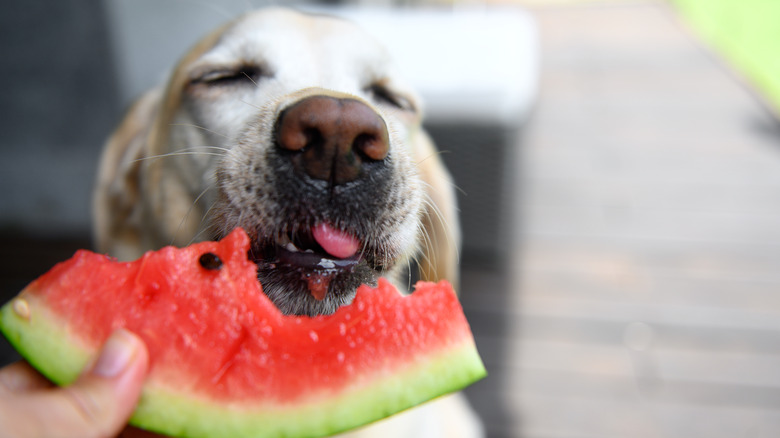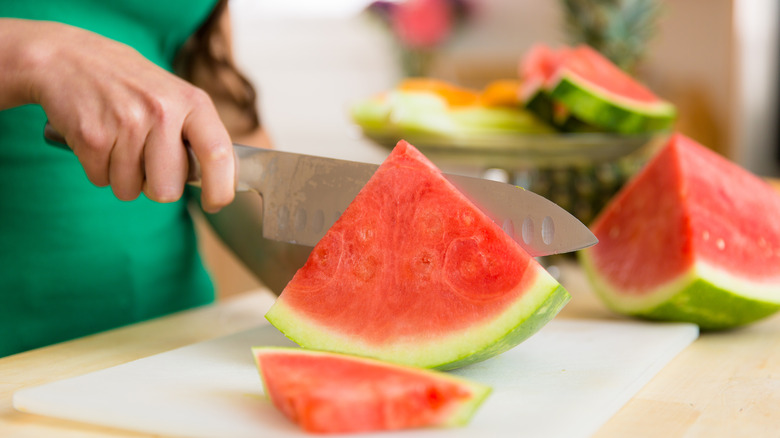Is Watermelon Safe For Dogs To Eat? Some Might Have To Skip This Hot Weather Snack
During those hot summer days, there's nothing better than a cool slice of watermelon. But after sweating it out at the dog park with your pup, can you share the fruit with your furry friend? Everyone knows that there are some human foods that dogs can't eat. Luckily, watermelon is safe for most pooches.
Not only is it extremely adorable to watch a dog go to town on some juicy watermelon, but there are also health benefits to the sweet treat. It's right there in the name! Watermelon is full of water, making it super hydrating. It's also low in calories and high in vitamins and antioxidants, making it a good choice for humans and their pups alike.
Of course, there are some caveats. First, it's a good idea to consult your vet before offering your pup any new human food. If your dog has a condition like diabetes, a sugary snack like watermelon likely won't be a safe option. Second, like most things, it's best to give your dog watermelon in moderation. And third, while the sweet, pink flesh is safe for dogs, don't feed them the seeds or the rind — both can cause digestive issues and present a choking hazard.
How to safely serve watermelon to your dog
Like any human food you hope to serve to your dog, you'll want to keep a few things in mind when dishing out watermelon. In an interview with Forbes, veterinarian Dr. Lindsay Butzer said that when you introduce watermelon to your dog for the first time, you should give them a few small bites. "If they enjoy it and don't show any adverse effects, you can gradually increase the portion," she explained. "But it's best to limit it to a few small pieces per day."
Watermelon is high in fiber and sugar, so if your pup eats too much, that could spell gastrointestinal distress. If you see signs like vomiting, diarrhea, or a lack of appetite, you can naturally aid your dog's digestion by offering small meals of bland food until they recover. As always, if symptoms are severe or persistent, call your vet.
Once you know your pup tolerates watermelon well, you can have fun with the way you serve it. Fresh or frozen chunks are great, but you can also puree it and freeze it in bite-sized pieces. This is a great option if you have leftover watermelon you aren't using. Additionally, if your dog can handle dairy, try blending watermelon with some plain yogurt and adding the mixture to a rubber toy or a lick mat.
Other summer snacks you can share with your pooch
If watermelon isn't your pup's snack of choice, there are lots of other hot weather treats that are generally safe to share with your furry best friend. (Of course, as mentioned, it's best to check with your veterinarian before introducing your dog to any food they haven't had before.) Blueberries, strawberries, and raspberries are all good options. Mangoes, peaches, and plums can be shared in moderation too. When it comes to summery vegetables that are safe for dogs in low quantities, try items like lettuce, snap peas, and ripe, red tomatoes (not green — those are toxic!).
For dogs who love chewing, freeze a small amount of mashed banana and let them gnaw on something refreshing and nutritious. On those sweltering summer days, delicious, frozen treats are the way to go. Make additional dog-friendly, icy snacks by blending together a combo of your pup's favorite safe fruit, unsalted peanut butter, and plain yogurt. To achieve the perfect bite-sized morsels, use a silicone ice cube mold. Your dog will thank you!


